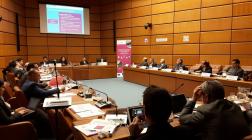UNODC Comprehensive assessment to identify gaps in the legal and institutional frameworks, needs, challenges and other opportunities in relation to the capacities to prevent and counter firearms trafficking and related offences in Iraq
From 28 February 2022 to 3 March 2022, in the framework of the project “Responding to violent extremism and terrorism, including a tailored approach towards rehabilitating children perceived as associated/affiliated with ISIL in Iraq”, and with support from the UNODC Iraq Office, a UNODC Global Firearms Programme (GFP)) delegation led by the Head of the Programme, Ms. Simonetta Grassi, participated in a scoping mission in Baghdad between 28 February and 3 March 2022.
The purpose of the mission was to meet relevant institutions and assess the current situation of illicit firearms circulation and trafficking and its links to terrorism and organised crime inter alia, and the state’s criminal justice response to prevent and counter these offences, with a view to identify specific priority needs and jointly explore the possibility of future initiatives from the GFP in Iraq. Following the mission and the information collected through meetings, research and study visits, the GFP drafted a report with the main findings of the comprehensive assessment, which will be shared with Iraqi national authorities to support their efforts to strengthen national capacities and institutional frameworks to effectively address firearms trafficking and its linkages with terrorism.
The project “Responding to violent extremism and terrorism, including a tailored approach towards rehabilitating children perceived as associated/affiliated with ISIL in Iraq” is integrated by five programmes from UNODC, including the Programme Office in Iraq, Terrorism Prevention Branch, Justice Section, AIRCOP and the Global Firearms Programme, and funded by Japan.
The project aims at:
- Enhancing mechanisms to disrupt the movement of high-risk passengers, including FTFs and returnees, as well as suspicious cargo/mail at Iraq’s international airports;
- Supporting Iraqi authorities in processing ISIL related criminal cases in a manner consistent with international standards and best practices, holding perpetrators accountable for their crimes.
- Improving protection from violence and access to services for children perceived as associated/affiliated with terrorist/violent extremist groups as well as those recruited and exploited by terrorist/violent extremist groups who have been released or are currently detained in pre- or post-trial facilities.
- Assessing and enhancing the institutional and legislative framework, to develop a roadmap in close cooperation with Iraqi counterparts to strengthen the capacities of national Iraqi border control, criminal justice, and arms control authorities in the future to effectively counter the arms-crime-terrorism nexus, promote the rule of law and, to this regard, foster judicial and law enforcement cooperation and information sharing. Enhance the institutional capacity of Iraqi counterparts to liaise and coordinate policies, approaches, and activities targeting various aspects of organized crime and terrorist networks, in coordination with relevant partners.
The Global Firearms Programme contributes particularly to the efforts towards the latter, by supporting the enhancement of normative and institutional frameworks and regulatory measures, to prevent and counter illicit access to firearms by terrorists.








